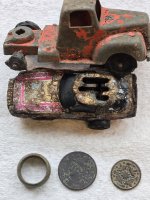49er12
Bronze Member
- Aug 22, 2013
- 1,238
- 1,627
- Detector(s) used
- Minelab xterra, Whites DFX, Notka Makro Simplex. Folks the price don’t mean everything, the question is are you willing to put in the time to learn the machine, experience will pay off I guarantee it.
- Primary Interest:
- All Treasure Hunting
I understand most where poor obviously back in 1700 to 1800s, when we go detecting for old foundations occasionally we find a silver coin, more likely Indian head penny, maybe large cent etc. but did the early settlers have anything such as silver or gold precious metals to have or hide in ground. Curious if they where poor what could we possibly find or expect to find other than typical, buttons or spoons. Thankyou because I can’t see these folks burying anything much , shoot they had nothing. Please prove me wrong am I searching incorrectly or am I right, thankyou






